MARRIAGE OF CONVENIENCE SWEETENED WITH MILLIONS – HOW FIDESZ PERSUADED THE LARGEST HUNGARIAN PARTY IN TRANSYLVANIA
MARRIAGE OF CONVENIENCE SWEETENED WITH MILLIONS – HOW FIDESZ PERSUADED THE LARGEST HUNGARIAN PARTY IN TRANSYLVANIA
At first Fidesz attempted to bleed to death the Democratic Alliance of Hungarians in Transylvania (DAHR). After they realized that DAHR cannot be replaced, they forced the party into a loyalty competition. The once freezing relationship between Fidesz and the DAHR evolved to close cooperation, allowing the Hungarian government unprecedented influence in Transylvania. Meanwhile, the opposition of DAHR that was once a “strategic partner” of Fidesz became a “traitor of the nation”.
“We cannot simply look away from László Kövér’s politically irresponsible raid in Transylvania” – stated Hunor Kelemen, president of the Democratic Alliance of Hungarians (DAHR) in July 2012, after the Fidesz politician had campaigned for the Hungarian Civic Party in Romania (political opponent of DAHR).
Eight years later, during the Parliament election campaign in November 2020, scrolling through the DAHR campaign videos on Facebook, it is not easy to decide whether it’s Fidesz or DAHR politicians we see campaigning.
As the election day was closing in, Facebook posts increasingly showcased members of the Hungarian government and the investments achieved with the help of the Hungarian government, while the issues connected to Bucharest were gradually pushed to the background.
How has the relationship between the two parties evolve from the initial „cold war” to these days, when it seems completely natural that phone messages from Hungarian foreign minister Péter Szijjártó are urging Hungarians to vote for DAHR?
How has it come to be normal by now that one of the foundations of the DAHR actively helps Hungarians from Romania register for the Hungarian parliamentary elections, and leading DAHR politicians publicly back up Fidesz in the campaign?
What does it mean that the NGOs in the backyard of the DAHR have received in recent years Hungarian public funds for largely the same amount as the Romanian governmental funding for the Hungarian minority of Romania?
The 1,2 million Hungarian minority living in Transylvania is by far the largest community living outside the borders of Hungary, with a complex institutional system.
This article offers an overview of the relationship of the largest political party of the community, DAHR with the Hungarian governing parties from 2010, the inauguration of the second Orbán government, to December 2020, when the new Câțu government was formed with the participation of the DAHR.
What are we talking about precisely?
When I’m speaking about the relations between the Hungarian governing party and the DAHR (henceforth simplified to Fidesz-DAHR relations), I mean primarily the relations, decisions and public communication of Viktor Orbán and high officials of the Hungarian government in areas of national politics on the one hand, and leading politicians of the DAHR on the other hand.
It is clear to me that the material presented here is by far not the full picture of the matter. This is due to a particular feature of Hungarian national politics: in addition to the leading politicians, many other political and business actors give declarations, seek and build partnerships more or less independently, and initiate projects with various Hungarian politicians from Romania, non-governmental organisations, businessmen and churches.
Some of the relations between leading Fidesz politicians and Hungarian public figures from Romania go back a long way, even as early as the 1980s. The presentation of several decades-long careers, complicated and often burdened relationships and disputes extends well beyond the scope of this article, so these will only be referred to briefly if relevant for the topic.
I will not present the geopolitical context and the Hungarian and Romanian political contexts due to lack of space. I will only mention the political events in Hungary or Romania or the Hungarian political stage in Romania insofar as they are relevant for the Fidesz-DAHR relationship.
The participation of the DAHR in the Câțu-government will likely influence the Fidesz-DAHR relationship. But since this is a relatively recent development, I will not endeavour into prophecies.
It also needs further research to reveal how the Romanian model of minority accommodation and the negotiation position of the DAHR in Bucharest was influenced by the expansion of Hungarian national politics, the ever growing Hungarian funding, and the Fidesz-DAHR relationship which became stronger by the year.
The effect of national politics on an individual level greatly defines the political options of the DAHR as well. The nation is being, or has already been institutionalised into a virtual community by procedures like the simplified naturalization and the like. However, I will not dwell on these at too much length either.
The conceptual framework of my interpretation of the events is defined by the works and lectures on national politics of Nándor Bárdi, Levente Salat, Tibor T. Toró, István Székely jr. and Tamás Kiss.
Press reviews completed with background interviews
This article builds on the press review on the abovementioned period based on the chronology of Frigyes Udvardy and the archive of the MTI (Hungarian Press Agency). The advantage of these sources is that the press reports accurately mirror the events and declarations of the given period.
Their disadvantage, however, is that they mostly focus on leading politicians and events readily accessible to a wide audience and rarely on what happened behind the scenes.
For instance, the reports published at the time only allowed for guesses about the atmosphere on Viktor Orbán and Hunor Kelemen’s first private meeting in July 2011 at Băile Tușnad/Tusnádfürdő (in the future, we will refer to both Romanian and Hungarian versions of transylvanian geographical names – editor’s note). We have nothing more than speculations on how politicians from both parties were conveying messages during the “cold war” period.
My interviews with active or retired politicians of the DAHR, or officials, journalists or social scientists who have inside knowledge about the political relations and system of funding also yielded uneven results.
“There’s full information blackout. Even those working inside the system are told only the essential information needed for their jobs.” – explained one of my sources, who used to be employed by a foundation close to the DAHR.
Very few people have access to the entire picture, on the things said at the private meetings, or the background of certain events. I have asked for interviews from some of the leading DAHR politicians – DAHR president Hunor Kelemen and his chief of staff, Zoltán Nagy among others. With a few exceptions, my letters of request have not been answered. I was still able to conduct about a dozen interviews – most of my sources requested anonimity.
“Shall we kick the DAHR apart?”
“You have to understand, I can’t make national politics here in the Carpathian basin without the DAHR” – Viktor Orbán used to say in private meetings in the 1990s. However, the president of Fidesz did not necessarily had in mind the close cooperation that has formed in recent years between the Hungarian government and the DAHR.
“In 1998, when Viktor Orbán came to Tusványos (a summer camp/university in Transylvania in Băile Tușnad/Tusnádfürdő known to be a meeting point to people interested in politics and Hungarian minority issues, later used by Viktor Orbán as a platform to promote his illiberal ideas) for the first time as Prime Minister, he asked in a private meeting: shall we kick the DAHR apart? Should we start investing into an alternative DAHR or not? We told him back then that there was no need for that, but instead we needed to strengthen the opposition within the DAHR” – recalled a politician who was a member of the Reform Group, once the inner opposition of the DAHR.
Although during the first Orbán government the relations with the DAHR then under the presidency of Béla Markó were normalised, there were tensions and frictions on a daily basis. The relationship between a hot headed Viktor Orbán, always two steps forward, and a level headed Béla Markó (the president of the DAHR at that time) who always consulted with everyone is best documented by the debate around the foundation of the Sapientia private university.
Why nobody consulted Markó?
“In 1999, Viktor Orbán – on his way to Tusványos – meets Béla Markó at the airport in Marosvásárhely/Târgu Mureș. During the approximately ten minutes long meeting Markó says that DAHR managed to change the law of education and although there is no possibility of a Hungarian university financed by the Romanian state, nothing stands in the way of founding a private university.
At a dinner in Tusványos, the topic of a private university with Hungarian funding comes up. Viktor Orbán goes home, then in August there comes the government decree about the foundation of the university, with a yearly funding frame of 2 billion forints. Markó is outraged by the news, why didn’t anybody ask him? The Fidesz raises its eyebrows and can’t figure out what’s going on” – recalls one of our sources.
Béla Markó confirmed, and also gave further details about this. Markó said that the idea of an elite postgradual university came up in 1998, during a discussion with Viktor Orbán, and he thought that was a good idea. They agreed that they will develop the idea in the future.
In 1999, there was indeed a meeting with Viktor Orbán on the Marosvásárhely/Târgu Mureș airport. They travelled together into the city, where Orbán had to meet Romanian PM Vasile Radu. „Yes, on the way from the airport, we talked about a private university that could be established with the help of the Hungarian government (this was different from the original idea of a small, elite postgradual university. We were talking about a broader educational spectrum) – explained Markó.
According to the former DAHR president, they had disagreements on two points: according to the Hungarian government, the university would have faculties in Kolozsvár/Cluj-Napoca and Csíkszereda/Miercurea Ciuc, and not also in Târgu Mureș/Marosvásárhely. The other debate was about the study programs: initially, they only offered complementary programs (programs that did not exist in Hungarian language at other state universities). “For me, this was a very important principle. At first, they kept themselves to this principle, but later they did not” – said Béla Markó.
There’s little we know why Béla Markó and Orbán’s relationship has deteriorated in time. A frequently mentioned story claims that the final break was caused by the fact that after the first turn of the 2002 Parliamentary elections in Hungary, when it wasn’t yet very clear who the winner was, Markó hurried to congratulate Medgyessy, the socialists’ candidate for prime minister.
Since Viktor Orbán considered the DAHR to be on his side, he thought it was betrayal.
“When I go out before the frontline and the enemy shoots at me, I’m prepared for that. But when they shoot at my back from my own camp, I cannot defend myself from it” – Orbán said once in Tusványos.
Another source recalls that Orbán stated once: no one had ever offended him as much as Béla Markó did. But he did not say then what this offence was.
„After elections, it is a custom to congratulate the winner. I said something like I congratulate the parties that were elected into the Parliament, especially MSZP, (the socialist party) that got the most votes. But I did not mention any names, and said that we should wait for the second round” – remembered Markó Béla. The former politician said that Fidesz tried to influence DAHR with various methods many times, including decisions regarding its cadre policy. „They soon found out that their wishes are not granted, and from that point, we had ups and downs in our relationship, despite the fact that we met the leaders of Fidesz often” – Markó said.
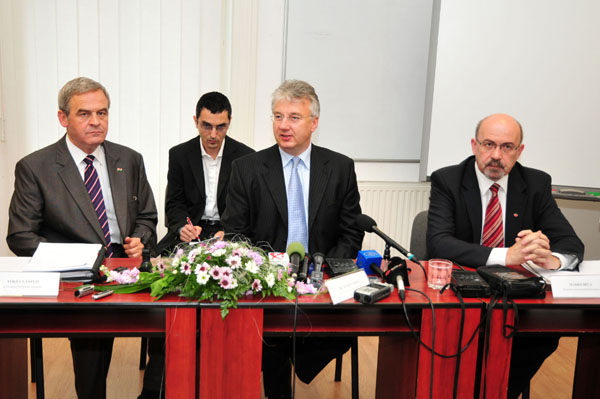
From left to right: László Tőkés, president of the Hungarian National Council of Transylvania, Zsolt Semjén Hungarian deputy prime minister and Béla Markó DAHR-president in the summer of 2010 in Kolozsvár/Cluj. Photo: Zágon Szentes
Why should you relate the same way to those who love you and those who don’t?
The then president of the DAHR formulated the principle of equal distance – or equal closeness – meaning that the DAHR must maintain good relations in both Bucharest and Budapest and with both rightist and lefties parties. However, this does not mean subordination, the DAHR takes all its decisions autonomously, in accordance with its own interests.
“Equal closeness is stupid. Why should you relate the same way to those who love you and those who don’t?” – thinks one of our sources, a politician of the DAHR, who also adds that it never happened after the fall of Fidesz in 2002 that Hungarian politicians from Slovakia or Serbia would visit Gyurcsány and not pay their respects in the Fidesz headquarters located in the Lendvay Street. Our source claims that Markó never made this gesture towards Orbán.
“I can’t remember a principle about visiting courteously everybody when we go to Hungary. We had discussions with the people we had business with, and it was natural we had more business with the government. But we maintained the relations with the opposition as well, this is not only natural, but also useful” – explained Markó Béla.
Whatever happened, following Senator Attila Verestóy who was the first to be blacklisted in the Fidesz, Béla Markó was also added to this list after 2002. So it became clear already during the socialist government that as long as Markó is the president of the DAHR, the relationship of the Alliance and the Fidesz would always be tensioned.
What does Markó think? Ask Hunor Kelemen!
Markó’s carefully singled out successor, Hunor Kelemen, whose image was minutiously constructed in the second part of the 2000s, did not have an easy job. The Fidesz saw him for a long time merely as a poor imitation of Markó.
In addition to their physical resemblance, this view also had its foundation in the fact that Kelemen very carefully tried in this period to always say exactly what the DAHR president said. “If you wanted to know what Markó thinks about one thing or another, you had to talk to Hunor Kelemen.” – a DAHR politician remarked ironically.
Another interviewee reported that Orbán “talked mockingly, contemptuously (about Hunor Kelemen) if his name came up. Zsolt Németh (a high ranking Fidesz politician with very good relationships in Transylvania) had to warn him that soon Kelemen could be the boss in Transylvania.” Kelemen only became interesting for the Fidesz and Viktor Orbán after his election, before that he had no relations with Orbán, and the Fidesz also didn’t seek contact.
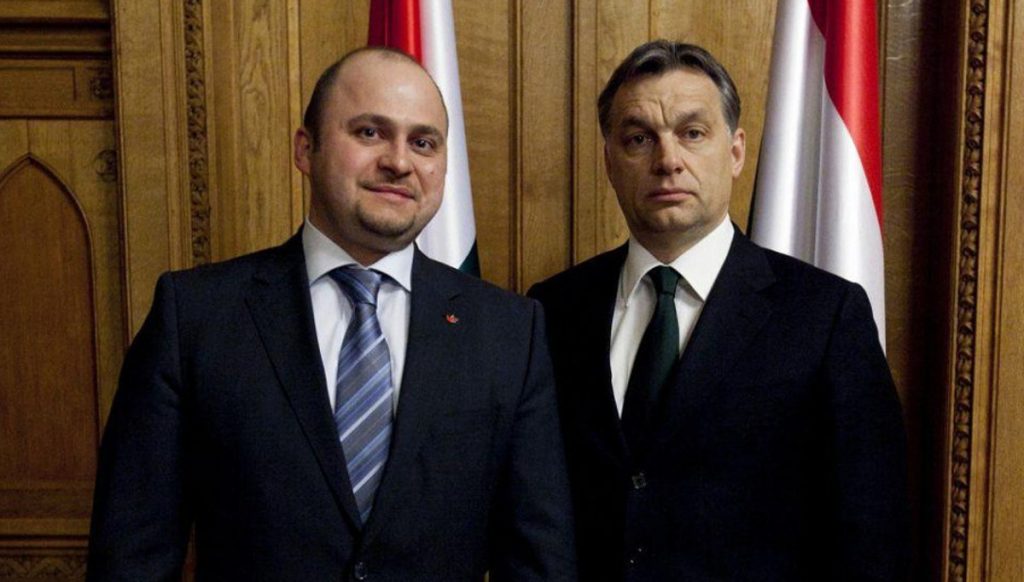
Gergely Olosz (left) together with Viktor Orbán. Photo: nol.hu
The big change came in February 2011, at the DAHR congress in Oradea/Nagyvárad. Three candidates competed for the presidency of the DAHR: Hunor Kelemen with the most chances, the liberal-minded Péter Eckstein-Kovács and Zsolt Semjén’s protegee, Gergely Olosz.
Olosz, the total mistake
“Olosz was a total mistake. We told Viktor Orbán and Deputy Prime Minister Zsolt Semjén not to invest in Geri, because he is corrupt, incompetent, and stands no chance.” – recalled our source.
Semjén, who had know Gergely Olosz since childhood as he attended the Benedictine high school at Pannonhalma, rejected the warning of the Transylvanian politicians saying that his protegee was denigrated by the Sekler politicians of the DAHR, Sándor Tamás and Árpád Antal, and that in reality it was precisely the other way round, Tamás and Antal were corrupt.
This episode highlights one of Viktor Orbán’s weaknesses: he takes important decisions without really researching the problem, and he is inclined to blindly follow the advice of people in his entourage.
And it is a strange irony of fate that Gergely Olosz, sentenced for three years of prison with execution for traffic of influence, is now hiding in Hungary, and his protector, Zsolt Semjén, is a frequent guest of Sándor Tamás and Árpád Antal.
Nasty and offensive speech at the congress
Back to the congress in Oradea/Nagyvárad: Ildikó Pelczné Gáll, who brought the message of the Fidesz to the congress, quite openly threatened the participants preparing for the election of the DAHR president. The vice-president of the Fidesz said that a political organisation can get tired too, just like the human organism: they may become sluggish and sickly. “You have reached this level today – she said. – If you vote for change today, we will offer you a helping hand in the future.”
We did not expect this speech to be so nasty and offensive – remarked one of our conversation partners – but there had been signs from Orbán’s environment that the Fidesz planned to make peace with the DAHR, if the organisation elected a president who was to Viktor Orbán’s liking.
One of the main duties of the newly elected President of the DAHR, Hunor Kelemen, was clear from the very beginning: he had to settle the relationship with Viktor Orbán.
After the congress, in an interview for the Hargita Népe newspaper, Zsolt Semjén stated very clearly the expectations of the Hungarian government: “The DAHR must change its principle of equal distance.” The Deputy Prime Minister responsible for national politics added: “the new start is open for everyone”.
DAHR politicians go to Hungary very often
We know little about what happened behind closed doors, but we do know that the number of trips to Hungary of the DAHR politicians continuously increased after 2011. Átlátszó Erdély obtained information on the trips abroad of DAHR politicians via freedom of information requests, although the DAHR offered no names or details. The data reveal that in 2009 – the last year of the socialist/Bajnai government – the DAHR officials had 11 trips abroad, and ten of these was to Hungary.
In 2010, in the year when the Fidesz came to power again, the number of trips increased to 38 (most of them also to Hungary). In 2011, the first year of Hunor Kelemen’s presidency, they reported 49 trips. This means that officials of the DAHR travelled to Hungary almost every week.
The number of trips abroad increased every year. 2017 is the last year that we have data from, in that year DAHR politicians reported 130 trips abroad. In the vast majority of the cases, the destination was Hungary, and the trip lasted for 2 or 3 days, or even a week. And although the data do not show whom they visited, it is most likely that their did not spend this time with the Hungarian opposition parties.
Despite more conciliatory press declarations and frequent meetings, the war between the DAHR and the Fidesz was still very much on in 2011. In April 2011, the Hungarian diplomats left the room at a DAHR Council of Representatives meeting, when MP Péter Lakatos mockingly criticised the Orbán government.
The bleeding of the DAHR
A much more serious offence than this incident for the DAHR was that in May 2011 the Hungarian government withdrew the handling of the educational support grants from the Iskola Alapítvány (School Foundation) founded by the DAHR.
The main reason why this measure affected the DAHR was not so much the financial gains from this programme, but the loss of all up-to-date data on Hungarian families from Romania, our sources explained. These data were invaluable for the political marketing of the DAHR in election campaigns. Let’s not forget, these were pre-GDPR times.
At the same time, the Progress Foundation, another foundation close to the DAHR, was also informed that it was no longer authorised to handle the administration of the Hungarian certificates (a program run by the Hungarian government that allowed Hungarians to have preferential treatment when traveling to Hungary). The closing down of these offices affected the DAHR because they worked in the same office with the territorial organizations of the DAHR, therefore they could pay for part of their operating costs and some of their employees from Hungarian government money.
In July 2011, in the EU camp from Izvorul Mureșului/Marosfő, Hunor Kelemen said: “we need Budapest’s advice, but we don’t need one thing: the Hungarian capital to tell us what is good for the Hungarians from Transylvania.”
A carefully orchestrated rendezvous at Tusványos
According to our knowledge, the first private meeting between Hunor Kelemen and Viktor Orbán took place a few weeks after the EU camp, on 23 July, at Băile Tușnad/Tusnádfürdő. We know little about this meeting, apart from one detail. The organizers left nothing to chance: to ensure that nobody disturbs them, they organised a different programme for the other politicians who attended the Tusványos summer university (among others, László Tőkés, Csaba Sógor and Péter Eckstein-Kovács) in the other end of the town.
The meeting wasn’t public, the news that it took place appeared in the daily newspaper Evenimentul Zilei. “I feel that the deadlock with the Hungarian government was broken (…) in the following period we can keep on amending this relationship, because both parties expressed their openness and will to cooperate (…)”, – stated Kelemen.
In parallel, the opposition of the DAHR was organising itself. On 15 September 2011, they registered the Hungarian People’s Party of Transylvania (HPPT) in Bucharest. “In this period before the registration of the party we received no support from the Fidesz. Orbán said, if they want to do this, let them. Let’s see what they are capable of, let’s support them, but not a lot.” – a politician of the opposition who took part in the collection of signatures and the registration process told Átlátszó Erdély.
It is true, however, that the Democracy Centres operated by the Hungarian National Council of Transylvania (HNCT), whose main activity was to assist with simplified naturalisation, also functioned as territorial organisations of the HPPT.
Just like the offices of Progress Foundation, the Democracy Centre, the HPPT and the HNCT all used the same offices and partly employed the same team. This practice is documented here.
We also revealed how Hungarian state companies supported the newly founded NGOs of HPPT politicians with approximately 1 million euros during the local government elections in June 2012 and the Parliament elections in December 2012.
Let them run and see what comes out of it
“While it was clear that the DAHR was cut off from the funds, it wasn’t clear in what way and with how much money the Hungarian government would support the HPPT” – political scientist Tibor Toró explained.
Another source claimed that the money was transferred with delay, and although Fidesz campaign guru Gábor Kubatov trained them, they received no political support from Viktor Orbán, the Prime Minister never campaigned for them.
“2012 was an experiment: is it possible to shatter the political monopoly of the DAHR? Not even Viktor Orbán himself could be sure that it would work, so he didn’t engage fully into it. It was much rather a thing like let them run, and see what comes out of it” – said Tibor Toró.
While HPPT hoped for 30-40% of the Hungarian votes, the results of the 2012 local government election helped clarify the power relations: the newly registered HPPT received 44,000 (0.45%) of the votes, and the other opposition party, the HCP 36,000 (0.37%). It was clear that neither of the two parties could really threaten the DAHR, which had 490,000 votes.
In July 2012, Viktor Orbán had meetings with the presidents of all three parties. “[Viktor Orbán] does not want to tell us in Transylvania what to do. He gave us no advice about the parliamentary elections in the autumn.” – the President of the DAHR declared.

Graphics by András Szén
Let them run and see what comes out of it
“While it was clear that the DAHR was cut off from the funds, it wasn’t clear in what way and with how much money the Hungarian government would support the HPPT” – political scientist Tibor Toró explained.
Another source claimed that the money was transferred with delay, and although Fidesz campaign guru Gábor Kubatov trained them, they received no political support from Viktor Orbán, the Prime Minister never campaigned for them.
“2012 was an experiment: is it possible to shatter the political monopoly of the DAHR? Not even Viktor Orbán himself could be sure that it would work, so he didn’t engage fully into it. It was much rather a thing like let them run, and see what comes out of it” – said Tibor Toró.
While HPPT hoped for 30-40% of the Hungarian votes, the results of the 2012 local government election helped clarify the power relations: the newly registered HPPT received 44,000 (0.45%) of the votes, and the other opposition party, the HCP 36,000 (0.37%). It was clear that neither of the two parties could really threaten the DAHR, which had 490,000 votes.
In July 2012, Viktor Orbán had meetings with the presidents of all three parties. “[Viktor Orbán] does not want to tell us in Transylvania what to do. He gave us no advice about the parliamentary elections in the autumn.” – the President of the DAHR declared.
Orbán does not want to get in conflict with DAHR voters
Orbán made a somewhat more balanced declaration at Tusványos that year: “we have strategic relations [with László Tőkés and the HPPT], and I wish them success, but I do not mean to get in conflict with the 80 percent of Hungarians who voted for the DAHR.”
The parliamentary elections held in December 2012 yielded a result similar to that of the local government elections: the chamber of deputies candidates of the DAHR received 380,000 votes (5.13%), the senate candidates 388,000 (5.23%). The chamber of deputies candidates of the HPPT gathered 48,000 votes (0.64%), and the senate candidates had 58,000 votes (0.79%).
“During the European Parliamentary elections in 2007, we saw that while the candidates of the DAHR won 283,000 votes, the independent László Tőkés got 176,000 votes. It was clear that there was a strong dissatisfaction with the DAHR, so the question was whether the votes for Tőkés could be moved over to the parties opposing the DAHR. The message of later elections is that this doesn’t work.” – a politician source assessed the situation.
Somehow “the shirt needs to be rebuttoned”
“It’s a hazard to keep the DAHR a few decimals below or above the 5% parliamentary threshold, you must not take this risk anymore” – declared Deputy Prime Minister Zsolt Semjén to the public media after the elections. The politician also said that the Hungarian political parties from Transylvania had to overcome their personal offences in the future and needed to cooperate in order to have a parliament representation.
“There are personal conflicts, but these are not personal questions but a set of actual or perceived offences caused by different political views” – said Semjén, who also thought that these conflicts had to be overcome, everybody must examine themselves, and somehow “the shirt needs to be rebuttoned”.
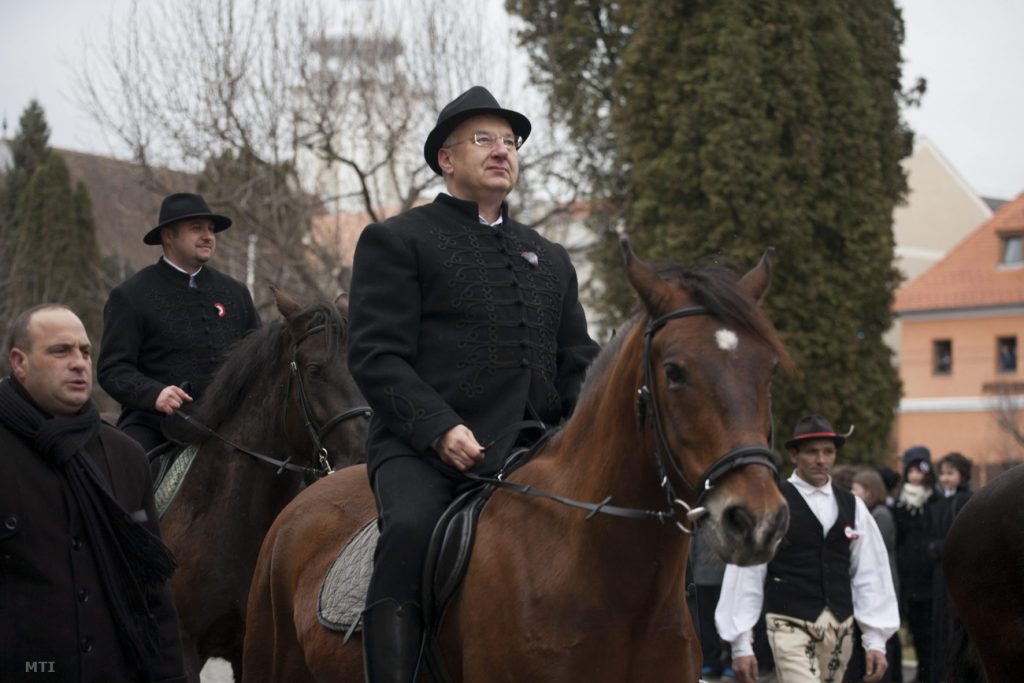
Zsolt Semjén rides along with hussars in the centre of Kézdivásárhely/Târgu Secuiesc on 15 March 2013. Behind him Gergely Olosz can be seen. Photo: MTI
Several meetings took place in 2013. There were some carefully optimistic declarations, but Hunor Kelemen still said in an interview to Erdélyi Riport in December 2013:
“We cannot speak about a compromise. We can say that our relationship has improved, has changed. And a great part of this is due to the fact that they see, they know, they feel that the DAHR is unavoidable in Transylvania. (…) In the past three and a half years the DAHR and the foundations close to the DAHR received no support whatsoever from the Fidesz-KDNP government. We did not ask for, and did not receive any. This has not changed even when our relationship with Orbán improved and we often met in 2013.
A milestone in the evolution of the Fidesz-DAHR relationship was the interview with Zsolt Semjén in the beginning of 2014, in which he said: one should avoid the situation that, because of a 85-92 percent of DAHR support, the Hungarians from Transylvania would not vote for the Fidesz during the elections in Hungary.
István Székely, executive vice-president of the DAHR, took this thought further, saying: “if I reverse this sentence, then the DAHR’s most important interest in this relationship becomes obvious: 95-96 percent of Hungarians from Transylvania are Fidesz voters . It is our interest that anyone should be able to support the DAHR and the Fidesz at the same time, and the bad relationship between Fidesz and the DAHR should not be an obstacle for how people vote.
The EP election campaign has brought the change
The DAHR offered a helping hand already in the registration process for the 2014 parliamentary elections. During the campaign, the second-row politicians of the DAHR – among them Sándor Tamás and Csaba Borboly, presidents of the territorial organizations of Covasna and Harghita counties, respectively – openly sided with the Fidesz.
“We consider that it is important that everybody used their voting rights, because it is our duty as citizens. I, for one, vote for this government, because their results are tangible. My expectation for this government is that it continues its strong politics in Hungarian communities outside Hungary.” – said Csaba Borboly.
On 6 April, expecting the results of the election in which the Fidesz again secured two thirds of the votes, 30-35 Hungarian politicians from Romania congratulated the winners. Amongst these, DAHR politicians like Hunor Kelemen, Árpád Antal, Sándor Tamás and István Székely. However, it is important to note that DAHR politicians had also waited for election results with the Fidesz before, the only novelty was in fact Hunor Kelemen’s attendance.
The breakthrough came in May 2014: Viktor Orbán and Hunor Kelemen campaigning together during the EP election campaign. On these elections “the DAHR and the Fidesz-KDNP mutually support each other (…) the Fidesz, the KDNP and the DAHR work for a strong European People’s Party fraction in the next five years. This can only happen if both the Fidesz and the DAHR have good results, and this needs that Hungarian people go to vote.” – declared Viktor Orbán in the park of the Roman Catholic Episcopal Palace in Satu Mare.
László Tőkés, MEP for seven years back, got a new mandate on the Fidesz list, and not on any Transylvanian one.
Presidential elections with cartoons and weather forecast
While two years previously, Viktor Orbán saw it as a kind of experiment that the representatives of the HPPT also ran on the elections as opponents of the DAHR, his opinion seemed to have radically changed by the 2014 presidential elections, despite the fact that this election had no weight compared to the parliamentary elections.
The HPPT proposed that Zsolt Szilágyi, Vice-President of the party, would also run for the election; at a meeting, the Prime Minister answered this proposition with a strange example about cartoons and weather forecasts, a HPPT politician informed.
“Guys, if you ask me, this is like the cartoons and the weather forecast. Neither of them is interesting, everybody wants to see the news, but if you don’t want to be late for the news, you have to watch the cartoons too. The weather forecast might probably interest a little more people than the cartoons.” – our source quoted Viktor Orbán.
“We were supposed to read it as guys, don’t run. We read it like it’s all the same for Orbán whether we run or not.” – our source reported.
However, this decision was a mistake: Viktor Orbán wished good luck for the DAHR president, which clearly proved that the Fidesz was not happy about Zsolt Szilágyi’s running for office against Hunor Kelemen. Not even Zsolt Németh, the traditional friend of HPPT took part in the campaign.
However, the presidential elections did not alter the power relations: Hunor Kelemen received 3.47% with 329,000 votes, and Zsolt Szilágyi 0.56% with 53,000 votes.
Nobody’s cut off completely
Although it looks like Viktor Orbán has lost interest in the HPPT ever since, there’s no sign that any of the yearly 250 million HUF (about 700,000 EUR) support for the HNCT for the simplified naturalisation programme, or the funds for different projects of the HPPT and its entourage would significantly decrease.
“Nobody’s cut off completely: in the last minute everyone receives a small gesture, some money, and this way they keep everyone inside the system.” – a political science expert source explained how the system works. In his opinion, the reason behind this is that it is cheaper to keep an unsuccessful project on a ventilator – and if needed, give it some job – than completely eliminate it.
Meanwhile, things happened in Bucharest as well: on 13 December 2014, the DAHR Council of Representatives decided that the DAHR should leave the third Ponta government. These were the last eight months of the DAHR as a governing party during our examined period.
A short theoretical overview
We need to make a short theoretical digression in order to understand how the position of the DAHR changed after it was forced in opposition, and in parallel the amount of Hungarian funds sent to Transylvania significantly increased.
A useful concept in this respect is the Hungarian ethnic pillarisation in Transylvania: this means that the minority community creates institutions of its own, in parallel with the social institutions of the majority, which makes the members of the minority community able to live their daily lives without interacting with majority institutions except on rare occasions.
The institutions working within the Hungarian community of Transylvania can be seen as a kind of asymmetric pillarisation. Not symmetric, because the Hungarian institution network of Transylvania is embedded within the Romanian society, which however is not another pillar, but the mainstream.
The DAHR is one of the key operators of the Hungarian institution network in Transylvania.
Tamás Kiss’s theory explained on several occasions helps to understand how the DAHR, after it became an opposition party in 2015, was used by the Fidesz.
For this, we need to introduce a new concept, the asymmetric minority accommodation. This means that in Romania there is no legal guarantee for ethnic power division, the division of resources between the majority and the minorities – in this case, the Hungarian community. This needs to be re-negotiated from case to case with the majority owners of the power.
Kiss thinks that the legitimacy of the DAHR within the community must be determined by its capacity to allocate resources, that is, how much resources it can negotiate for its own institutions and Hungarian-inhabited territories.
When the national politics of Hungary outbids the Romanian state
Before the first part of the 2010s, the amount of the funds coming from Hungary was relatively small, therefore the DAHR was primarily concerned with obtaining resources from Bucharest, which were much higher. It also managed to successfully monopolise these resources, meaning that the money from Bucharest always came via the DAHR. But after 2015, the DAHR was no longer a factor in the government, and the anti-corruption drive made it impossible for the party to go on with its strategies in Bucharest based on individual interests and negotiations.
In parallel with this, the financial support coming from Hungary started to grow exponentially after 2016. They were no longer complementary, but generated and modified institutional processes. The Hungarian national politics “outbid” the Romanian state. According to Kiss’s interpretation, this is the context in which the DAHR-Fidesz relationship must be seen.
I must add to this that, to the best of my knowledge, there is no record about the exact amount of the sources that the Romanian state secures for Hungarian-inhabited territories, and how much of that money is due to the DAHR’s governmental activities. In the absence of such a record, it is difficult to assess whether the biggest resources come from the Hungarian or the Romanian state.
The end of the DAHR monopoly
It is for certain that the position of the DAHR fundamentally changed with their weakening presence in Bucharest and the spreading of the Hungarian national politics: it was forced into a competition of loyalty. What does it mean?
While in the negotiations with the Romanian government the DAHR and its leadership was always in a monopoly situation (the Romanian parties almost never tried to directly address the Hungarian community, going around the DAHR), the Hungarian national politics has a different way of working.
In the Hungarian System of National Cooperation (SNC), the control happens through overlapping authorities and functions, and this is also valid for national politics. This field is formed by half a dozen leading politicians in addition to the prime minister, and 15-20 institutions of national politics, where the actors build networks in Hungarian communities outside Hungary seemingly independently and in competition with each other.
The decisive criterion in this competition is not the measurable efficiency, but loyalty. The result is that the actors not only follow Viktor Orbán’s wishes, but often try to “anticipate” it and want to accomplish something that the Prime Minister didn’t actually ask for.
In this context the earlier monopoly position of the DAHR has vanished. There are reports that in the time of the Socialist governments Béla Markó had access to decision lists and could change them as he wished. Now the top leadership of the DAHR is just one of the actors competing for the graces of the Hungarian government and trying to prove its loyalty.

Graphics by András Szén
“Be aware of everything, decide almost nothing”
Our sources claim that although Hunor Kelemen can suggest projects for financial support, but has no say in who gets the money and how much. Politicians of the DAHR are often directly related to one or another of the patronage networks built by some member of the Hungarian government, independently from the DAHR leadership. This is a further limitation of the influence of top DAHR politicians.
Although Hunor Kelemen managed to consolidate his position, the DAHR under his leadership no longer resembles the highly centralised organization which it used to be in Béla Markó’s time. Markó insisted to make his own decisions about the tiniest details, as many anecdotes show.
One of these goes that the DAHR press releases had to be sent over to him, he printed and proofread them before being released. Another story is that, allegedly, he personally decided not to have ketchup and mustard in a cafe at a congress, for fear the attendees would stain their suits.
Kelemen let go of the peripheries and built a much less centralised DAHR. “I want to be aware of everything, but decide almost nothing” – he often says. It was unthinkable in Markó’s time that a territorial organization should get into the naturalisation process, or that a local DAHR politician should put forward their opinion on autonomy or Romanian-Hungarian cohabitation which the top leaders of the DAHR cannot share. However, this has become natural by now, our sources claim.
The DAHR is controlled with never-before-seen amounts of media funding
The weakening positions of the DAHR were also caused by the never-before-seen amount of media investments of the Hungarian government. If our overview is complete, then the Transylvanian Media Space Association (Erdélyi Médiatér Egyesület) with Szilárd Demeter behind it received 5.25 billion HUF (around 15 million EUR) funding since December 2017 and bought the overwhelming majority of Hungarian media from Transylvania.
Although two years ago many were afraid that the strictly centralised Fidesz-propaganda would appear in Transylvania together with the money as well, there are no perceivable traces of it just yet. Our sources say that the important part is not what they write about, but much more what they don’t: the publications published by this media outlet cannot contain any views critical towards the Hungarian government.
Although examples have existed for materials critical of the DAHR, the latest election campaigns have eliminated those too. “This conglomerate has one function only: it controls the DAHR” – said one of the sources, who claims that the DAHR would be in trouble if this media outlet suddenly switched to a critical voice during an election campaign. Another source, a politician of the opposition, explained the logic of Fidesz behind this overall purchase: “we buy it ourselves so that no one else can buy it.”

Szilárd Demeter (left), the “unofficial ambassador” of the Transylvanian Media Space Association (Erdélyi Médiatér Egyesület), and Mohácsi Árpád László, the president of the association. Photo: Facebook
Money taps opened for the DAHR
Back to the timeline: while Hunor Kelemen still declared in December 2013 that the DAHR and the foundations close to DAHR did not receive any funding from the Fidesz-KDNP government, this has changed since 2015.
It was in February 2015 that one of the foundations of the DAHR, the Eurotrans Foundation, signed an agreement with the Prime Minister’s Office and the Ministry of Foreign Affairs and Trade which entitled it to take part in preparing the documents for the simplified naturalisation, a process that enables Hungarian nationals to obtain Hungarian citizenship in a simplified process. It receives a yearly 250 million HUF for this end (790,000 EUR on the rate of 31 December 2015. Henceforth, I will use the European Central Bank’s exchange rate for the last day of the given year to transform sums from HUF to EUR).
Eurotrans Foundation uses this money to operate a series of offices across Transylvania (addresses here). If we corroborate these addresses with the addresses of territorial organizations of the DAHR, we see that many overlap. It raises the suspicion that the maintenance expenses of the DAHR territorial offices are – at least partly – covered from this Hungarian money.
We have reached out to Zoltán Nagy, President of the Board of the Foundation, we did not get any answer to our questions about how they separate the activities of the Eurotrans Foundation and the territorial offices of the DAHR.
A new step in the Fidesz-DAHR relations was July 2016: it is quite a gesture that Hunor Kelemen was the only Transsylvanian leader that Viktor Orbán invited for dinner at a meeting in Tusnádfürdő with the leaders of Hungarian organisations in the Carpathian basin. László Tőkés, long-time ally of the Fidesz, was only invited to meet the PM the next morning, at a work breakfast.
The reason is that the relationship between Orbán and Tőkés had deteriorated in the meantime. At a book launch in May 2015, Tőkés called the national politics of the Hungarian government “impossible to follow” and “non-transparent”, while at a MÁÉRT [Hungarian Permanent Assembly where leaders of all Hungarian parties from the Carpathian basin get together] meeting he refused to take the stage and sign the closing declaration.
Uprooting all critical voices
At the end of 2016, another foundation of the DAHR, the Progress Alapítvány (Progress Foundation) responsible for publishing the organisation’s media projects, discontinued one of the smaller online media platforms with a decreasing number of users, the Erdélyi Riport. As a publisher, it also fired some of the leftist journalists of one of the most viewed portals of the Hungarian press in Transylvania, the maszol.ro.
Although the publisher claimed that they only took these measures for cost efficiency purposes, and there is no direct evidence that the Hungarian government asked the DAHR to silence the critical voices, a DAHR politician, one of our sources, explained:
“The Fidesz is an extremely centralised party. If a critical voice appears in any media close to the government, it carries a message. They think the DAHR also works this way. If some criticism is published on the maszol.ro, the Transindex or the Erdély TV (media outlets close to the DAHR), they call Hunor Kelemen and ask him what happened. And he asks: why, what happened?
Imagine that the Hungarian government media publishes materials like the ones usually published in the Hungarian media in Transylvania. The Fidesz only knows that these outlets are operated on DAHR money, so it assumes that these materials somehow mirror the DAHR’s views, and the DAHR tries to send a message with these”.
The “streamlining” of media outlets close to DAHR did not stop here. In May 2017 the Transindex had to move its offices located in the attic of one of the buildings of the Iskola Foundation after it had published an article about the L’Alchimiste scandal (a chic restaurant in the center of Cluj/Kolozsvár owned by the wife of Nagy Zoltán. The restaurant was opened using public money). Later, in April 2019, the Erdély TV’s Fidesz-critical presenter, Attila Gáspárik, was fired without explanation.
The DAHR can use the economic development programme in its campaigns
According to declarations in March 2017, the economic development programme which had already been active in Hungarian-inhabited parts of Serbia (Voivodina) and Ukraine for some time, would start in Transylvania as well. After a discussion with Viktor Orbán in Budapest, Hunor Kelemen declared to Erdély TV:
“We talked about the Transylvanian programmes which are supported by the Hungarian government, and which will start in 2017 and 2018, including the economic development programme which had already been tried out in Voivodina and Ukraine and works excellently. It will start in Transylvania as well in 2017, first on a smaller territory, then from 2018 on everywhere from the Seklerland to the Partium.”
The programme is initiated by the Hungarian Ministry of Foreign Affairs and Trade. The first model programme was introduced in Mureș County in 2017, with a budget of 1 billion HUF (3.2 million EUR).
The economic development programme is another unfriendly gesture to the HPPT. To our knowledge, the basis of the programme is actually a plan of the opposition, the Mikó Imre Plan, which is based on a strategy of economic development elaborated by Transylvanian economists employed by the HNCT, and experts of the VÁTI urban planning and development company. They had been trying to present and sell the plan for the Hungarian government for years.
“We asked them to include us into the board of the Pro Economica Foundation which handles the funds, employ our experts in the assessment process, let us take part in the promotion campaign” – said one of our sources, a politician of the HPPT. None of their requests were heard.
However, the DAHR may use these development projects in its promotion materials during campaigns. Attila Balázs, Economic Director of the DAHR, and Levente Novák, Vice-President responsible for territorial organisations, are both members in the Board of Directors of the Foundation.
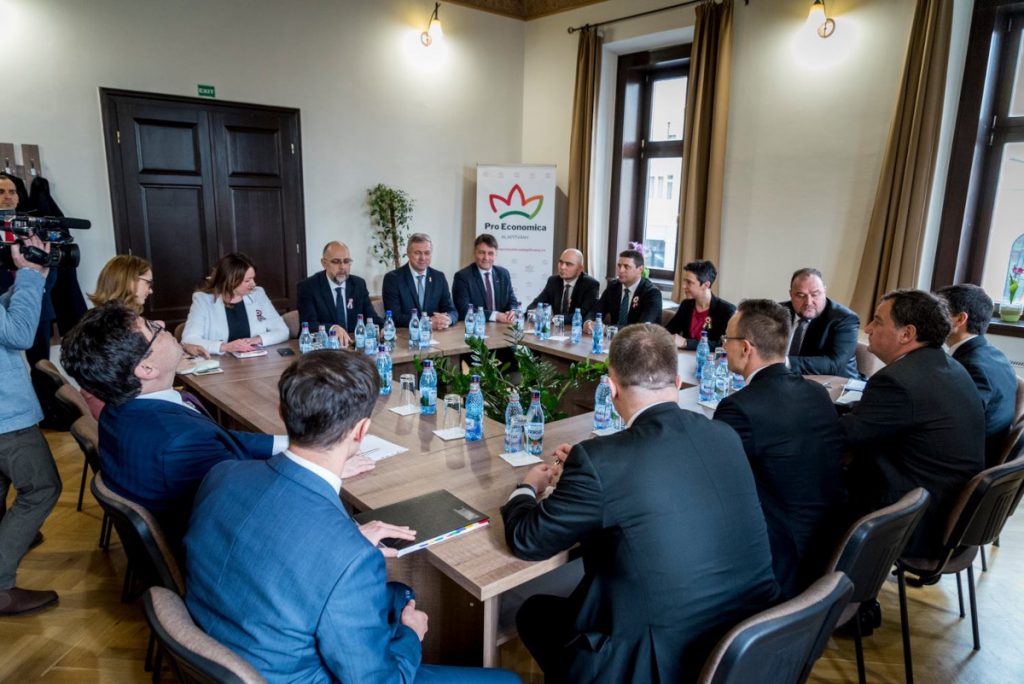
The leadership of the DAHR meets the delegation led by Hungarian Foreign Minister Péter Szijjártó. They talked about the economic development programme. Photo: the Facebook page of the Pro Economica Foundation/Tamás Gönczy
Hunor Kelemen encourages votes for Fidesz
While the Eurotrans Foundation with the HNCT were offering their help in the registration process preceding the Hungarian parliamentary elections, another premiere took place in September 2017: the DAHR President publicly supported the Fidesz.
“It is in our interest that Hungary should be led by a government which proved that Hungarians from Transylvania have an important place both in its national political visions and everyday practices” – he said.
The final breakup with Markó’s principle of equal distance happened in February 2018. Gyula Molnár, President of the Hungarian Socialist Party (HSP), and Gergely Karácsony, candidate of the HSP and the Párbeszéd for Prime Minister, invited Hunor Kelemen for a dinner after a public forum in Cluj/Kolozsvár.
“They asked me what we think they should do in Transylvania during the election campaign. I told them very frankly: nothing. This is a completely superfluous waste of time and energy, because I think: Hungarians from Transylvania know very clearly who to vote for” – Kelemen recalled the conversation.
Meanwhile, the Eurotrans Foundation eagerly helped the registration of Hungarians from Transylvania for the elections in Hungary: by the first days of February 2018 they mediated the recording of 35 thousand Hungarian citizens living in Romania on the electoral lists. More than that, the foundation also played a role in collecting the postal votes and sending them forward to the Hungarian foreign representations (the Democracy Centres had the same task).
While Csaba Borboly, President of the Harghita County Council, said that Hungarians from Transylvania had not only the right, but the duty to vote in the parliamentary elections in Hungary, the Pro Economica Foundation which handled the economic development programme signed financial support agreements with 521 persons for an amount of 1.5 billion HUF for equipment or breeding stock acquisition, or the cadastral registration of agricultural lands.
Twice as many postal votes for the Fidesz-KDNP
The Fidesz-KDNP won again at the parliamentary elections on 8 April 2018 with a two-thirds majority of the votes. The governing party received 96 % of all postal votes, a total of 225 thousand votes from outside the borders (we do not know the distribution by countries). This was nearly double of the number of votes in 2014, but while the 122 thousand votes in 2014 resulted in one or two mandates, this time they were not enough to get a mandate.
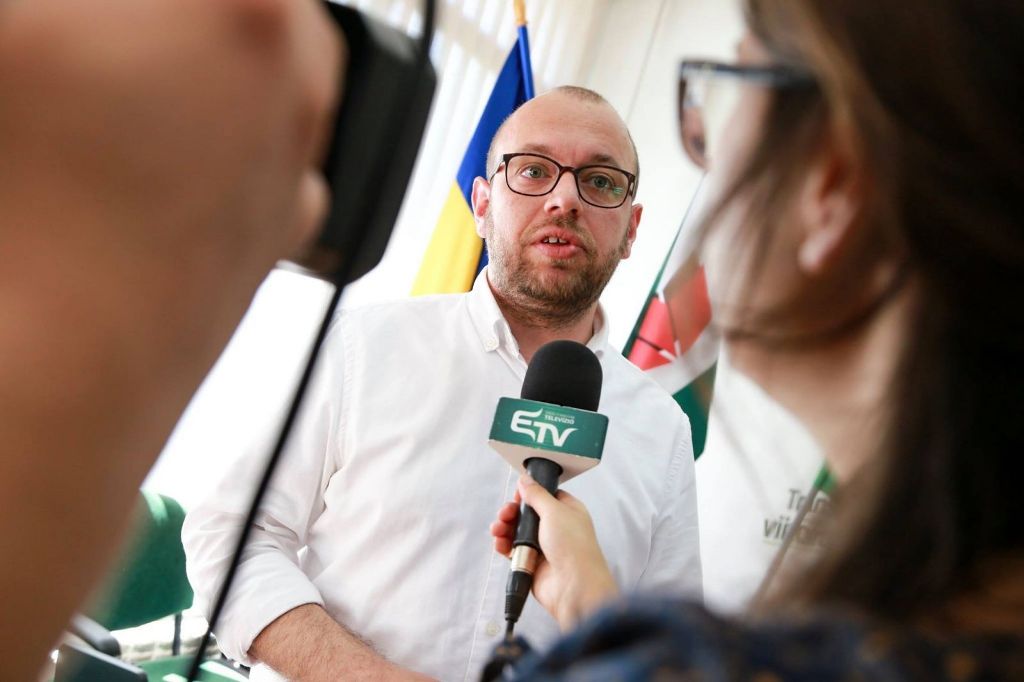
Bálint Porcsalmi, the executive president of the DAHR. Photo: DAHR
The 2018 referendum in Romania about the constitutional definition of the family somewhat altered the image that the DAHR – while becoming more and more cooperative with the Hungarian government – followed the rhetoric of this government in all its undertakings. Although many leading politicians of the DAHR supported the referendum about a constitutional definition of the family based on the marriage of a man and a woman, and this was indeed congruous with the anti-gay rhetoric of the Fidesz-KDNP, Bálint Porcsalmi, Executive President of the DAHR, declared in an interview for maszol.ro before the referendum:
“I do not agree that marriage can only happen between a man and a woman. Although gay marriages are not permitted in Romania, but I am convinced that the opposite is also not something that should be condemned: in 15 member states of the EU people of the same sex can marry. I also do not agree with the opinion of my Senator colleagues that the new draft submitted now has a better content than the current constitutional regulation. Because it is no better: either legally, or spiritually. On the one hand, it maintains the restrictive, bad definition of the family, on the other hand it discriminates in the long run an important community, citizens who should have the same rights as the heterosexuals.”
In November 2018, Péter Szijjártó, Minister of Foreign Affairs, declared at Cluj Napoca the economic development programme which offered support to farmers and small enterprises in parts of Maros County would be extended to the Seklerland. The 2019 budget secured 50 billion HUF for economic development programmes, and the Seklerland programme would have a budget of 25 billion.
At the DAHR Congress in February 2019, Zsolt Semjén said that Viktor Orbán and Hunor Kelemen shared a trusted cooperation, which was forced by the Hungarian voters from Transylvania. He added: “Nothing can be accepted which weakens the DAHR”, because if the Alliance became weak, the strong representation of the Hungarian interests in the Transylvlanian local governments and the Parliament in Bucharest would come to an end.
In March 2019, the Fidesz was about to be suspended from the European People’s Party (EPP). However, Hunor Kelemen told the Romanian public television that the two MEPs of the DAHR would vote against the suspension.
During the EP election campaign which started in the meantime, Viktor Orbán took a two-day tour in Transylvania on the invitation of the DAHR. He inaugurated two establishments built from Hungarian support: the feed mixer in Sânpaul / Kerelőszentpál and the Ice Hockey Academy of Seklerland. He said that the Hungarians from Transylvania who want to strengthen the overall Hungarian representation in Brussels, must vote for the DAHR.
“Who thinks that the price of the grants must be paid is wrong”
On a press conference, Hunor Kelemen was asked about the Hungarian government grants for foundations close to the DAHR. He said that the DAHR never received any support from Hungary and whoever thought that the price of the grants must be paid somehow was wrong.
The carefully balanced formulations of the early years were officially over. In September 2019, Kelemen told at a Romanian-Hungarian youth meeting at Sfântu Gheorghe/Sepsiszentgyörgy that Viktor Orbán should not be criticised but copied. “Romanians should do the same for the Romanian communities living outside the borders what the Hungarian government does for Hungarians outside their borders. We can feel on our own skin what it is like when the Hungarian government stands up for us.” – the DAHR President said.
The election race is a “national treason”
Due to the coronavirus pandemic, the local government elections were postponed in Romania from March to September 2020. Once again, the Fidesz brought the ammunition for the DAHR campaign. They announced a new stage of the economic development grants, inaugurated various projects paid by the Hungarian government, and Hungarian politicians sent several Facebook messages.
Zsolt Semjén said that the counter-candidates of the DAHR “had no chance”. Árpád Potápi went even further: he said that to nominate Hungarian candidates who had no chance of success on settlements where the Hungarians are not the absolute majority was “an act that comes against the interest of the Hungarian community”. Even on settlements where the Hungarian majority is over 80%, “the competition between Hungarians and Hungarians is not a good solution” – he said, “because it causes people to jump at each other”.
Despite the objection of the opposition parties, after the elections, on 12 October 2020, Potápi went further with his statement before the National Cohesion Committee of the Parliament: to set another candidate on the DAHR candidate in Bihor/Bihar and Satu Mare/Szatmár is national treason.
From government formation negotiations in Bucharest directly to Viktor Orbán’s office
Arguably the most telling way to end our timeline on the Fidesz-DAHR relations is the event of 19 December 2020, when right after the government formation negotiations in Bucharest – after reaching an agreement on the composition of the coalition but before clarifying the operative details – Kelemen left for Budapest for discussions with Orbán. Bertalan Havasi, Deputy State Secretary in charge of the Prime Minister’s Press Office, failed to communicate the nature of the urgency that justified the DAHR President’s hasty trip to Budapest.
How does the current grant system work?
“The socialist governments also favored their own of course, but there always was a more-or-less transparent board, the support policy had a well-defined form, a framework. The Fidesz gradually eliminated these forms, everything is decided based on informal relationships and agreements” – said one of our sources, a politician of the DAHR’s opposition.
Although in the first years of the second Fidesz government, in 2011-2013, the projects were still collected and coordinated by Transylvanian politicians – István Székely for the DAHR, and Balázs Gergely for the HPPT –, by now every decision is taken in Budapest.
Although our interview partners couldn’t give a precise answer to all our questions regarding the functioning of the grant system, they unanimously claim that the main source of the financing, the Bethlen Gábor Alap (Bethlen Gábor Fund) has become nothing else than a place for payouts. It provides the institutional framework for political and personal decisions negotiated with various entities, ensuring the formal agreements are signed, and the paperwork connected to the handling and financial reporting of the grants is dealt with.
They also agreed that the major projects with budgets amounting to billions of forints are decided by Viktor Orbán personally, the Gábor Bethlen Fund only executes the government decree. At present, two people from Transylvania can pitch major high-budget projects to the Prime Minister: Béla Kató, Bishop of the Reformed Diocese of Transylvania, and DAHR president Hunor Kelemen.
“And out of the two, it is Kató whose relationship with Viktor Orbán is of the kind that he can meet with the PM whenever he wants” – says one of our sources, a social sciences expert.
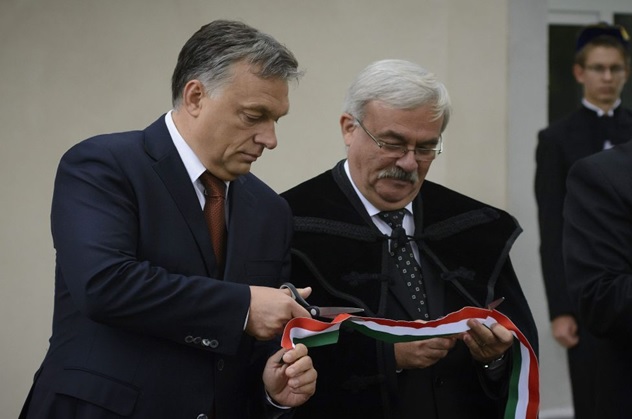
Viktor Orbán and Béla Kató (right), the Bishop of the Reformed Diocese of Transylvania. Photo: maszol.ro
“There must be someone who takes them inside”
As we are told, the projects with a lower budget of between 500 million and 1 billion (1,5-3 million EUR) are decided by Zsolt Semjén, Deputy Prime Minister responsible for national politics. “However, there must be someone who takes them to Semjén, and they usually check those projects with Hunor Kelemen”. Minor projects can be chosen by Árpád Potápi, State Secretary for national politics of the Prime Minister’s Office.
The small projects are collected by Réka Brendus, Deputy Head of the Transylvanian Department of the State Secretariat for National Politics, and it is probably her who decides who gets the support and who doesn’t. “This circle is for almost anyone, if they are in good or neutral relationships with the government.” – our source reported.
If the Hungarian government initiates a project, they try to find partners across the borders depending on the available budget. A good example of this is the nursery school building programme, for the first stage of which Viktor Orbán set apart a sum of 8.9 billion HUF (28.8 million EUR) in the last days of December 2016.
One of our sources who has a close knowledge of the working of the Gábor Bethlen Fund said that this decision about an extremely high sum on one of the last workdays of the year came as a surprise to everyone.
But since the money had to be spent by the end of the year, they hastened to phone partners across the borders to submit applications so that they can sign agreements and transfer the money. However, there was no previous need assessment, therefore the places for the construction of nursery schools were chosen more or less randomly.
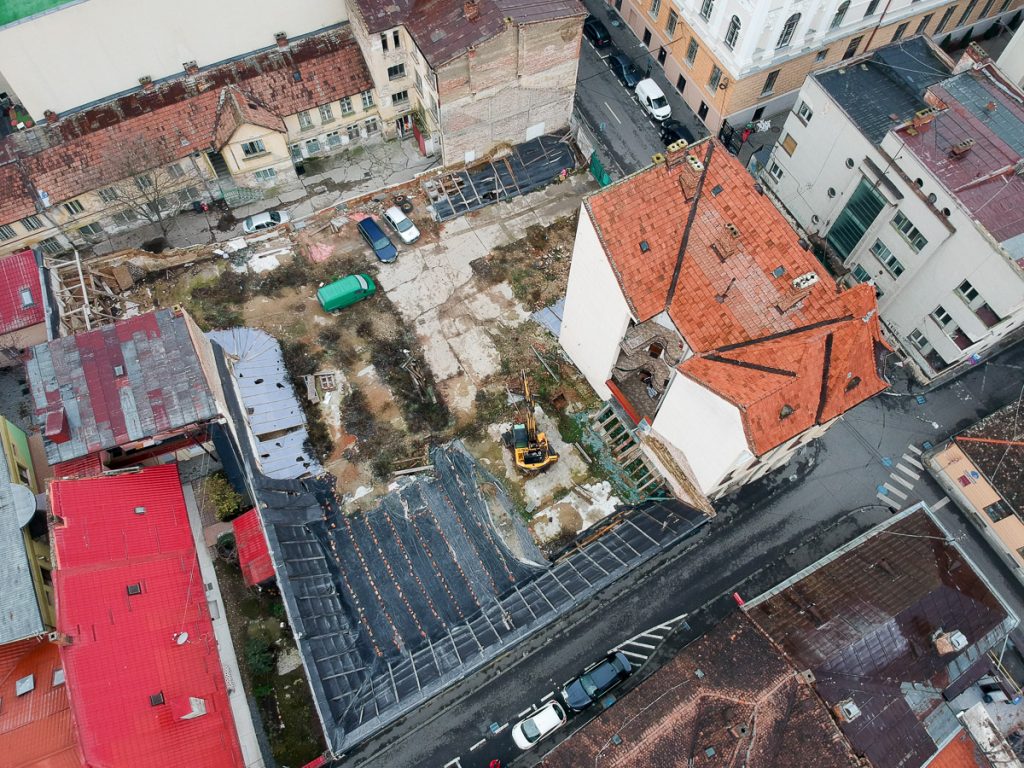
The building of an old typography in the center of Kolozsvár/Cluj has been demolished. A cultural center will be built here. Photo: Zoltán Egyed Ufó
The DAHR as an investor, just like the churches
Today, the foundations close to the DAHR handle as much money coming from Hungarian funding, if not more, than the Romanian governmental support for the Hungarian minority in Transylvania, handled by the DAHR.
The Iskola Alapítvány (School Foundation), a foundation of the DAHR, is one of the institutions that has lately become even more important than the Eurotrans Foundation. This was founded by the DAHR in 2004 to handle the educational grants program coming from Hungary. Later it started a still operating flat rental programme for higher education teaching staff in Cluj, and it also offered a controversial loan for the restaurant of the president’s wife in the downtown of Cluj.
After 2017, the School Foundation has received significant amounts of Hungarian funds (on the chart below the grants are given in EUR).
It may be accidental, but it is an interesting detail nevertheless that the decision on the first support of 300 million HUF (970,000 EUR) came just at the time of the big money distribution in late December 2016 (this money was later wired back, as the ownership of the real estate they sought to buy was unclear).
A week later, in the first days of January 2017, it became public that the Progress Foundation discontinued the Erdélyi Riport because of financial reasons, and fired some of the journalists of maszol.ro, critical of the Hungarian government.
Our overviews show that apart from this 300 million grant from 2016, in the 2017-2020 time period, the School Foundation received some 6.6 billion HUF (19.9 million EUR) from the Gábor Bethlen Fund. With this funding, it became one of the top recipients of Hungarian funding in Romania, along with the Sapientia private university and the Reformed Diocese of Transylvania.
A part of this money is used to finance cultural and educational programmes such as the centenary programme series 1000 years in Transylvania, 100 years in Romania, or the afternoon educational programme functioning in 33 schools. Most of the money, however, is used for real estate investments.

One of the few pictures of Zoltán Nagy to be found online. Despite the fact that the Head of the DAHR President’s Cabinet is present on nearly every event, he appears extremely rarely on photos, and has no social media presence. Photo: the Facebook page of the DAHR
Zoltán Nagy, who takes care of things
In 2018, the Foundation bought and demolished a building in the city centre of Cluj – the former Minerva typography – to build a cultural centre in its place. In the same year, it bought the Sonnenfeld palace in Oradea/Nagyvárad, also with the purpose to renovate it and turn it into a cultural centre.
In 2019, the Foundation acquired an art nouveau-style building in the centre of Miercurea Ciuc/Csíkszereda, and a turn-of-the-century villa in Tușnad-Băi/Tusnádfürdő. Both buildings need restoration works.
The President of the Board of both the Eurotrans and the Iskola Foundations is Zoltán Nagy (nicknamed BigZé), one of Hunor Kelemen’s long time team members. His current function is the Head of the DAHR President’s Cabinet. Actually: his right hand.
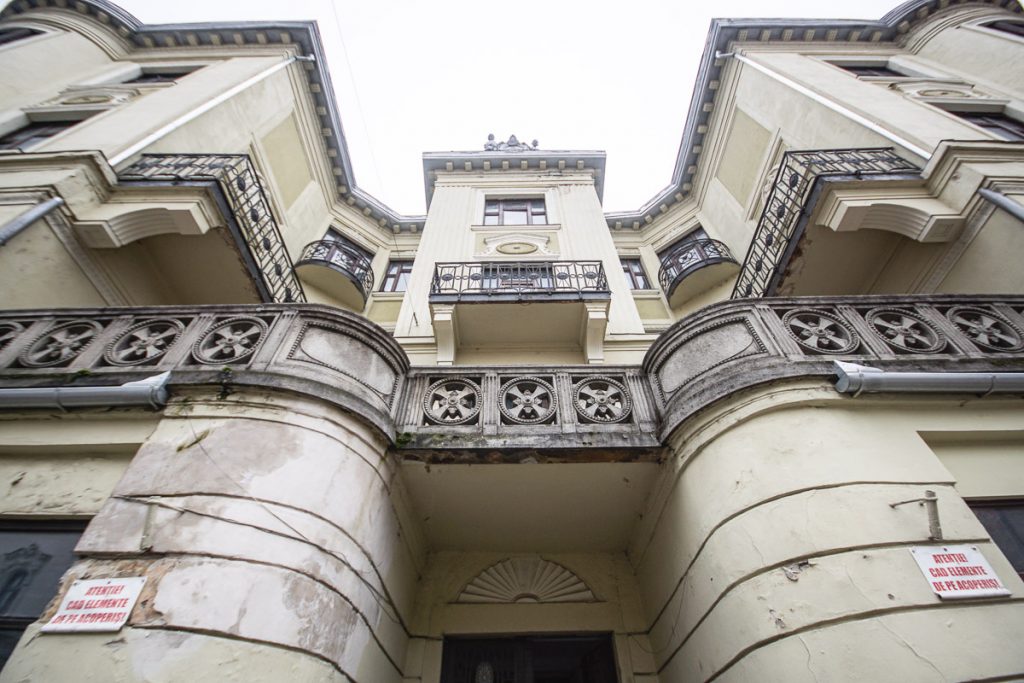
The Sonnenfeld palace in the centre of Nagyvárad/Oradea. Photo: Zoltán Egyed Ufó
He is loyal, pragmatic, and “rough as needed in conflicts”: this is how his acquaintances characterise Zoltán Nagy. The former biologist and bat researcher works with the Iskola Foundation from the early 2000s, and after a short digression as state secretary he found the role that fits him best. Away from the limelight, he is very efficient in handling the things that Hunor Kelemen has no time and energy for.
Zoltán Nagy holds in his hands everything connected to the management of DAHR projects and the Hungarian government, and the administrative details of political negotiations. He is the driver of the DAHR President on his trips to Budapest, and he is also the contact person with the Hungarian state administration.
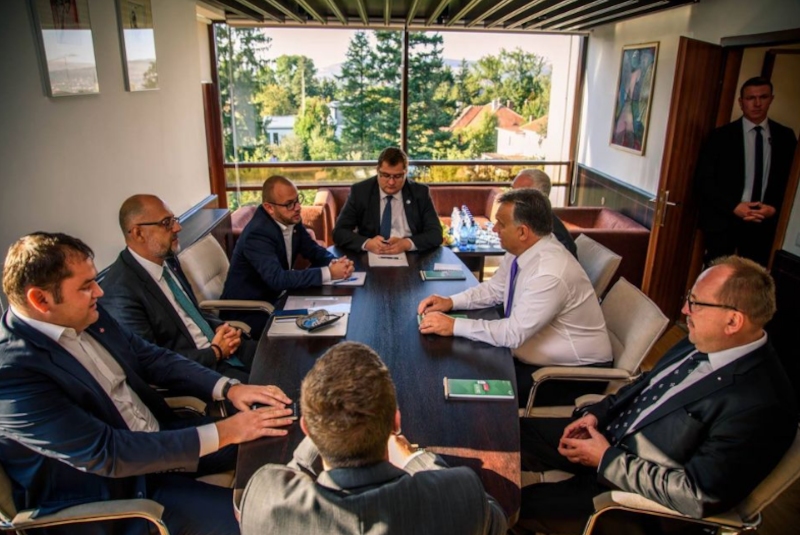
Viktor Orbán and the members of his cabinet at the DAHR Executive Presidency in Kolozsvár/Cluj on September 30, 2017. Hunor Kelemen and Viktor Orbán are facing each other, the DAHR is represented by Bálint Porcsalmi executive director and Attila Cseke senator. Near Viktor Orbán sits Zsolt Németh, the head of the Parliamentary Committee for Foreign Affairs and Zoltán Balog, Minister of Human Resources. At the end of the table sits János Nagy, the personal secretary of Viktor Orbán, and facing him, with his back to the camera, Zoltán Nagy can be seen. Photo: the Facebook page of the DAHR
“He goes as many times and needed, he talks as many times as needed”
“On Orbán–Kelemen meetings, there is János Nagy (Orbán’s personal secretary – editor’s note) with his notebook, writing down what they agreed. János Nagy forwards the PM’s instructions to the legal department, and these become the government decrees. In parallel, Kelemen also tells his Head of Cabinet what they agreed, and Zoltán Nagy starts out. He goes as many times and needed, he talks as many times as needed, János Nagy also makes a phone call, if needed.” – detailed a DAHR politician.
“The Hungarian financial support only interests Hunor Kelemen to the extent that he takes the projects to Viktor Orbán. As soon as the decision is taken, everything is left for Zoltán Nagy: the details of a programme, how an investment goes is not of interest for the DAHR President, everything is solved by the Head of Cabinet and his team. He gives political ammunition, solves problems, and the financial reports are also in order” – says our source.
Nothing is known about the affairs of the Iskola Foundation
The Iskola Foundation is an institution completely separate from the DAHR. Although its yearly budget rivals that of the DAHR, the affairs that go on in there are unknown to anyone – even the board of the foundation, or the DAHR’s economic director. “He is humanly affected by having such a huge amount of money at his disposal.” – said a source who has known Zoltán Nagy for a long time.
According to his former colleagues, Zoltán Nagy does not complicate things unnecessarily: he allocates the job, then checks whether it’s done, he is not interested in other details. “He is a party soldier: he does his job, the price paid for it doesn’t matter. He solves problems, he’s not a philosopher” – our source characterises him.
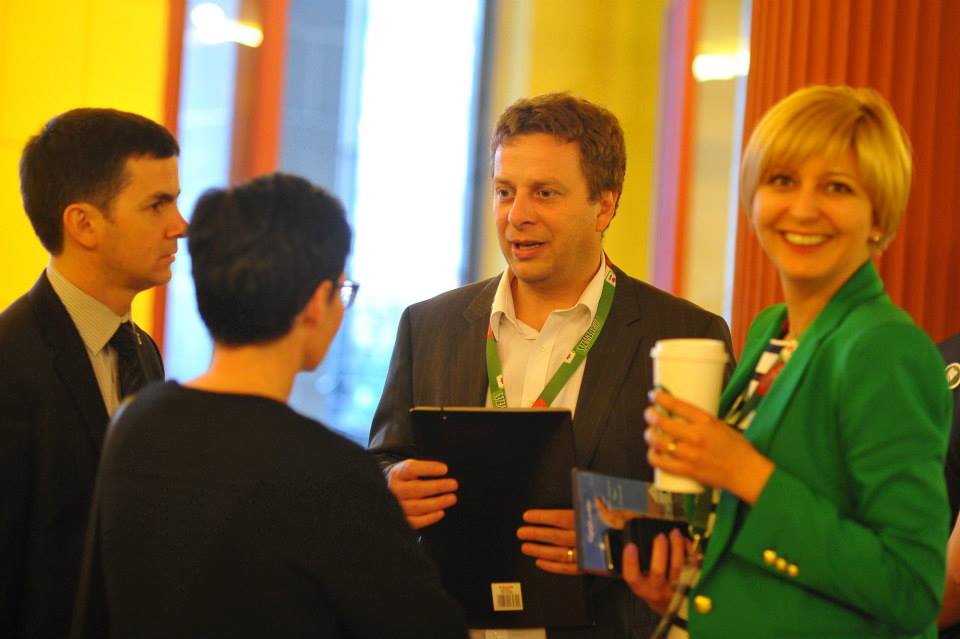
Zoltán Nagy together with his wife, Nagy-Debreczeni Hajnalka, the former press aide of Hunor Kelemen, currently the publisher of one of the largest internet news portals of the Hungarian community, maszol.ro. Photo: the Facebook page of the DAHR
An important ingredient of Zoltán Nagy’s success is that he and his wife, Hajnalka Nagy Debreczeni, managed to become indispensible for Hunor Kelemen and his family. The Head of Cabinet is Kelemen’s driver; his wife controls the entire editorial staff of the maszol.ro news website as their publisher, and in addition to that, she does the shopping or even babysits the children of the Kelemen family.
Kelemen Hunor has been “taken hostage”, some people say, meaning that the DAHR president can only be reached through the Head of Cabinet.
So is there a great project then?
Is there any kind of plan that the Hungarian government would like to achieve in Hungarian communities across the border, such as Transylvania?
The aim is the institutional and individual integration of the Hungarian-inhabited territories of the Carpathian basin, the building of a parallel society, and the preservation of the break between the majority and minority society. However, apart from this, there doesn’t seem to be any other written strategy, Tibor Toró explains.
The political scientist also adds that the Fidesz provides the framework and the money, and within this framework everybody is free to do what they want, to lobby as they want. The various interest groups compete with each other, and this suits the basic nature of the Hungarian society of Transylvania, that’s why they prefer Viktor Orbán.
Although there is no clear strategy as to what can be funded, it is still clear to everyone what is considered taboo: there are no Hungarian-Romanian joint programmes, ethnically mixed institutions, or programmes for sexual minorities. However, few people feel that these are limitations, because the conservative Hungarian society of Transylvania generally rejects these as it is.
